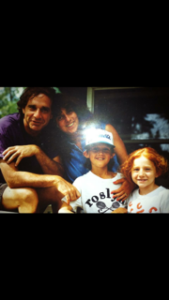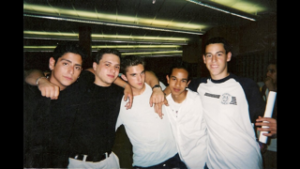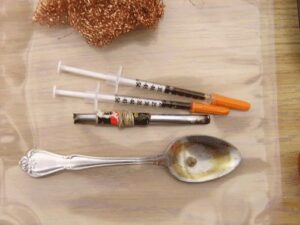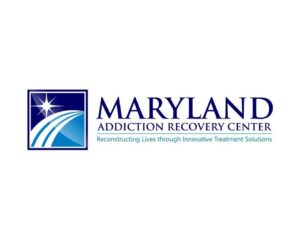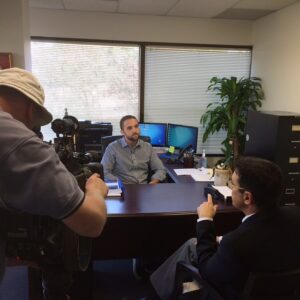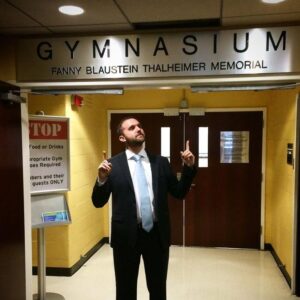All too often life is not what is seems and sometimes your own is misunderstood. It might be the fragile facade you put up to mask your pain. Repressed feelings are ten times more powerful than those from which you simply refrain from sharing until the time is right. And if you bury it too deep, the repercussions can be overwhelming.
That is until you find the courage to share, to turn to someone else for hope, a helping hand and in turn tap into the inspiration of life.
There is no doubt – everyone has a story.
I am Mark Brodinsky and this is The Sunday Series.
The Sunday Series (71): Addicted To Life
Getting rid of the stigma might take a lifetime, but Sam Bierman is determined to try.
Sam’s childhood was as he puts it, “normal”. As a kid he played sports and grew up in a good neighborhood. His parents worked hard, his Dad had a career as an attorney, his mom was a psychotherapist. Sam and his sister Farah had the privilege to spend their summers at sleep away camp. His parents encouraged the adventure since it was at one of those camps where they first met and the end result was the creation of this “normal” family.
All seemed normal until the summer of 1995 when 12-year-old Sam and his 9-year-old sister returned from their summer away – to learn their mother had been diagnosed with melanoma. Over a six-month period her condition worsened and by February 1996 the beast got the best of her and she passed on.
For the family the pain cut deep, for Sam the depths of his pain was something he kept locked away. “When it happened I shut down inside”, says Sam. “I didn’t know how to deal with the emotions, how to grieve properly, be happy or sad, or show what I was feeling inside. I was very confused and the path I chose was to bury my emotions deep down, put on a facade that I was OK, and was moving on. But what was really going on inside me was that I felt different from my peers, like I didn’t fit in anymore.”
“I didn’t really even talk to my sister about it, or my Dad. So naturally because I was burying such strong emotions I inflicted a lot of pain on myself, I was constantly in pain. All my teenage years I thought everyone was breathing a little easier than I was. They had a manual on life, I just got skipped over. I don’t blame anyone else, there was no lack of love or friends. There was plenty of love from my father and grandparents, especially my mom’s parents. My grandfather sold his business right away and he and my grandmother sacrificed everything to be there for us while my Dad worked. My Dad handled the situation similarly to me, but my parents were very social people and had very good friends, they valued them immensely. My Dad could lean on them for support. For me, all the attention and sympathy just made me feel worse.”
Until that first taste of alcohol – and sweet relief.
Sam says he took his first drink about 6 months after his mom died. “I was at a New Year’s party with my Dad and a lot of adult friends. All the adults were outside, the kids were inside and the other kids dared me to sneak and take a drink of vodka. I did. I immediately felt warmth, ease and comfort. All of my problems just went away. Alcohol eased my pain, at least temporarily. And the more I did it the more temporary relief I wanted.”
Relieve the pain, fight the pain, hide the pain, do anything to keep the pain at bay – it wasn’t long before Sam added pain killers to his cocktail of relief. “At 16 I got introduced to opiates”, says Sam. “Vicodin, Percoset and Oxycontin which was huge, just hitting the market and extremely addictive. Once I found opiates the relief was better than everything I experienced before, it was so good I found it extremely hard to stop.” Add in the booze and some marijuana and there was very little pain to deal with, just a constant high.
Somehow, despite the drugs Sam, as he puts it, “skated through high school” and was accepted by Indiana University. But by the time he started college Sam said the habit was bad enough he had withdrawal symptoms if he didn’t take something. He says he needed the drugs not only for the emotional pain, but now to relieve the physical pain as well. If you do enough of a drug you develop a tolerance, then a dependence and then withdrawal if you remove it from your system: sweats, insomnia, feelings of hot and cold, almost like having the flu.
“In college there weren’t a ton of kids who had Oxycontin habits”, says Sam. “So I drank my way through the withdrawal symptoms, finding some pills here and there until I could get back home to Long Island over the summer and be around my old friends and pick up the pill habit again. A good amount of my home friends were hooked too.”
Although obviously hooked, the facade continued. Sam managed to graduate from college, becoming what he calls a functioning alcoholic. “Everything looked good on the outside”, he says. “I went to class, I had friends, but as soon as I went back to my room I would start drinking, or sniffing around for a pill.”
Sam could function so well that after a few months out of school he found a job at a small, but solid finance and mortgage company. But during his search for post-college employment he also made a new friend.
Her name was heroin.
Sam has a vivid recollection of his first time with his new girl. “Once I found heroin that was it. Nothing in the world mattered to me, no job, no family, no friends. All of that was completely out the window and completely secondary to getting more heroin, which brought me an amazing sense of euphoria. Every time I did it was like the first time I drank, an incredible sense of ease and comfort came over me. I had no more worries, nothing hurt me.”
Over the next two to three years Sam took his addiction to a new level, going from sniffing heroin to intravenous use. He eventually stopped working, he figured who had time for a job? His job was finding more heroin. He resorted to stealing money from his family, friends, even manipulating his grandparents, the same one’s who had sacrificed it all to care for Sam and his sister at the time of their daughter’s death. He would visit them, spend time with them and then in turn leave with some money which he used to buy more drugs. He had running partners, one guy would sell drugs and pay for the habit, the next day Sam would do it. Anything and everything to keep dancing with the devil.
Sam says he was living his life in limbo, or “purgatory” as he describes it. Every night he would swear it off and every morning he would wake up and his first thought was how could he get more. Sam says, “I wanted to die, but didn’t want to die. You just exist, going day-to-day. There were plenty of nights I would just lie in bed and think my family and friends don’t want anything to do with me, (not that they knew what was happening), and it’s very sobering, there is a little piece of your sanity still in there. I would tell myself in the morning I am going to stop, go get help and go get a job, but when morning came all I could think was how can I get more dope. I was pretty much on an 8-hour cycle with the drug. I wasn’t really even getting high anymore.” Shooting up was basically the only thing keeping Sam from checking out.
The turning point came when Sam developed an infection on his hand from using the drug intravenously for so long. On a visit home, Sam’s father noticed the infection and took Sam to the emergency room. His Dad sat there while the doctor laid out what was going on – the infection was so bad, the veins so ravaged they had closed – and the doctor said if he couldn’t get in to relieve the infection he might have to remove Sam’s hand. The doctor managed to find a vein and relieve the infection. But a new pain had surfaced, the sense of regret, the destruction of trust, the look of despair and disappointment Sam now saw in his father’s eyes. Now his father realized what was happening to this boy he raised, coached and put in the best schools, trying to give him the best life he could, even after they both lost the woman they loved so much.
Sam admitted everything to his father and shortly thereafter a decision was made to send Sam to live with his mom’s sister in Florida. A treatment center, a relapse and a halfway house, another relapse and finally a phone call home brought Sam and his addiction to his knees. He says on the phone his dad told him, “you have a choice, stay in treatment or hit the streets, take your pick.” Sam went back to treatment and the last time he ever used drugs is etched in his memory…January 30th, 2007.
Sam say getting sober meant meeting a whole new group of people who helped him make good decisions. Let’s face it you are a product of the people you spend the most time with and these new friends helped save Sam’s life. He says he took their advice, went where they went, did what they did and he ended up getting a job at the Caron Foundation, a world-class treatment program dedicated to helping people of all ages battle addiction. Sam worked his way up to director of operations for the company and made two great friends, Zach and Aura Snitzer. The couple decided to move up north to Maryland, open their own addiction center and they wanted Sam to help. Though not wanting to leave Caron, after some serious contemplation, Sam decided to make the move and follow Zach and Aura. The couple had become like family to him and he was ready to help to get this brand new addiction treatment center off the ground.
The result: MARC – the Maryland Addiction Recovery Center, (http://www.marylandaddictionrecovery.com/), a private substance abuse facility located in Baltimore County, Maryland, offering an innovative treatment approach to issues of drug and alcohol abuse. Sam has found his niche and he has learned one of life’s greatest lessons – one that happens so frequently in life, your pain can be someone else’s gain. The ability to overcome, to persevere, to dig out from the depths can become a life lesson for someone else and the goal is to give back.
Sam says the MARC model makes them stand out in the world of addiction treatment. It is a two-step strategy: treat addiction as a family disease and use a multi-disciplinary approach, where the entire team at the facility knows the person struggling with an addiction and everyone plays a part. Every patient knows every counselor. Sam says he would rather make a huge breakthrough and help change the lives of just a few people at a time, then to make only “small dents” in the lives of too many, (https://www.facebook.com/pages/Maryland-Addiction-Recovery-Center/429467867150428)
For Sam the goal is also to change the perception of addiction: “There is such a strong stigma with addiction and mental health”, Sam says. “I feel a lot of people look at it as a minority, inner-city or indigent problem. It is not. Addiction, like cancer does not discriminate. When it comes along it is powerful and it doesn’t matter about age, socio-economic status, race or religion. I know, I lived it.”
And Sam Bierman is living “it” in a new way, facing the pain head on and realizing the best addiction is the one drug you can take every day, from sunrise to sunset, to get high.. on life.
Until next time, thanks for taking the time.
Mark
Mark Brodinsky, Author, Blogger, Speaker, Emmy Winner, USHEALTH Advisors, (http://www.ushagent.com/markbrodinsky)
Author: The #1 Amazon Best-Seller: It Takes 2. Surviving Breast Cancer: A Spouse’s Story
(http://www.spouses-story.com/)
If you have a suggestion for The Sunday Series, send an e-mail to markbrodinsky@gmail.com.
Join the Tribe! Receive an e-mail about new posts from It’s Just About… Life & The Sunday Series, by entering your name and e-mail address on the blog, it’s free and spam-free.


